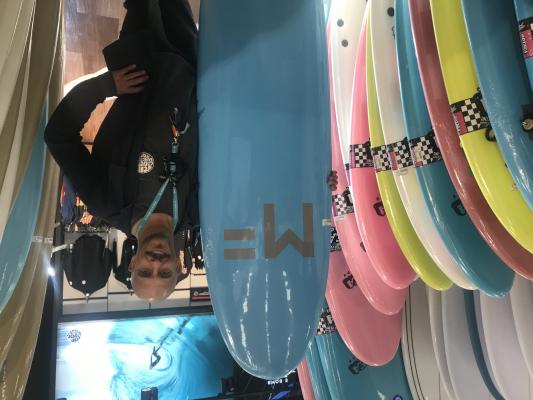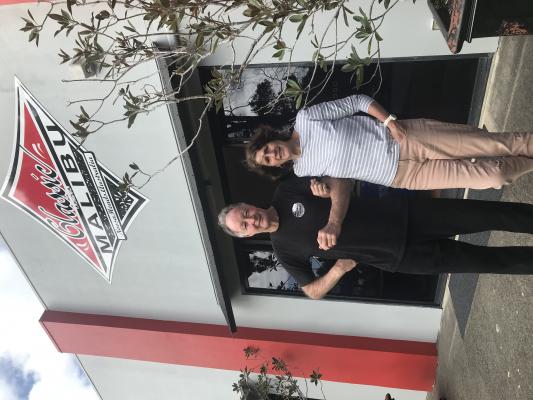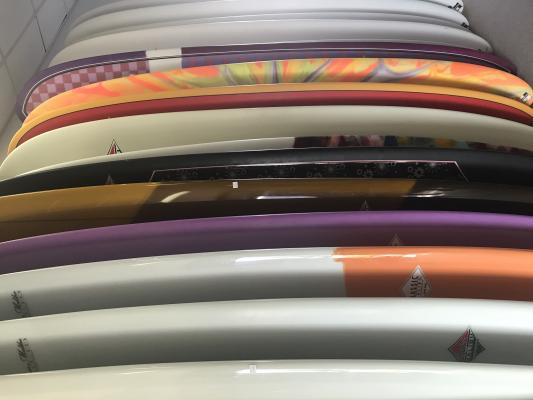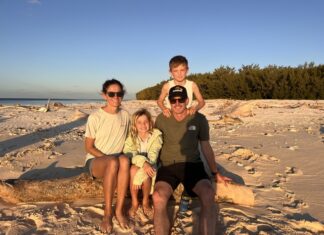They say every cloud has a silver lining, but the black cloud of Covid-19 has delivered a pure gold lining for Noosa’s struggling surf shops. PHIL JARRATT reports.
Reaping the benefits of a trans-Pacific trend that none of them saw coming, and with some reports of a 300 percent increase in sales, surfboard manufacturers and retailers are not asking how the boom started but does it have to end?
Barely containing his glee, Dane Wilson, manager of Rip Curl’s megastore in Noosaville, reported that overall autumn-winter sales were up over 80 percent on last year. “But the bulk of the increase has been in surfboards, not surfwear,” he said. “Since the initial shock of Covid-19 wore off and people realised they had to stay sane through lockdown, it’s been all about families going surfing together. Fathers and sons buying matching soft boards, with mum on a mal. And typically, the tradies have been buying new boards for their quivers, usually something a bit different from what they normally ride, like a fish or a mini-mal.”
Rip Curl’s biggest seller is the Mick Fanning model DHD soft, a board that suits beginners but can also transition into a fun small-wave performance board. Dane echoes the sentiment of retailers across the country when he says he simply can’t keep the racks stocked with soft boards, with wetsuits for women and kids also flying out the door.
Meanwhile in Noosa Junction, Sideways Surf Shop manager Michael Court wouldn’t reveal hard numbers for his own shop but agreed with the consensus of high street traders around the country that 300 percent increases were the new normal. “This is the largest jump in surfboard sales I’ve seen in 10 years or more in surf retail,” he said. “It’s just unbelievable. We’ve sold out of softs twice this week!” Interestingly, the first evidence of the new surf boom surfaced in California while the state was still in full lockdown with most beaches closed to surfers, and beach town surf shops following suit. US website The Inertia reported that Santa Barbara-based Channel Island Surfboards, one of the biggest brands in the world, had closed its shops and offered only a kerbside pickup for factory orders. In the first month CIS sold 50 stock boards from the kerb. When surf shops cautiously began reopening in late May, the boom really kicked in.
In Australia Sean Doherty reported on Coastalwatch that the boom here dated back to early April, quoting Jason Stevenson of JS Surfboards on “the perfect storm”: “The government was handing out money, nobody had a job and the swell was pumping! By the end of the month retailers were paying us cash up front because they couldn’t get enough surfboards.”
Back in Noosaville’s industrial estate, Peter and Janet White’s Classic Malibu not only benefited from the Covid surf boom, but also a heartfelt desire across the community to shop locally. Bernie Filer’s Zee Wetsuits, just up the road and the only Australia-made wetsuit manufacturer, felt the same love. The industry veterans, like the retailers, had never seen it so good.
Says Janet White: “When it first started we thought we were in for a hiding. We started getting cancellations on our custom orders, and with the border shut, the passing trade just stopped. When the surf is up, we do good business. Well, the surf was up, but it was only the locals enjoying it. And then people started to realise they had time on their hands, and they weren’t broke. Might as well enjoy it! March/April ranged from 30 to 50 percent down on last year, and now we’ve turned it around to be 25 percent up in May and June.”
Retailers and manufacturers that Noosa Today spoke to realised that the boom is likely to be short-lived, as the realities of lower wages or reduced hours in the post-Covid world kick in and the spending slows down, but this gold-plated winter might be enough of a boost to help the surviving “ma and pa” surf shops – once seen in every beach town in Australia – get through the tough times ahead.










